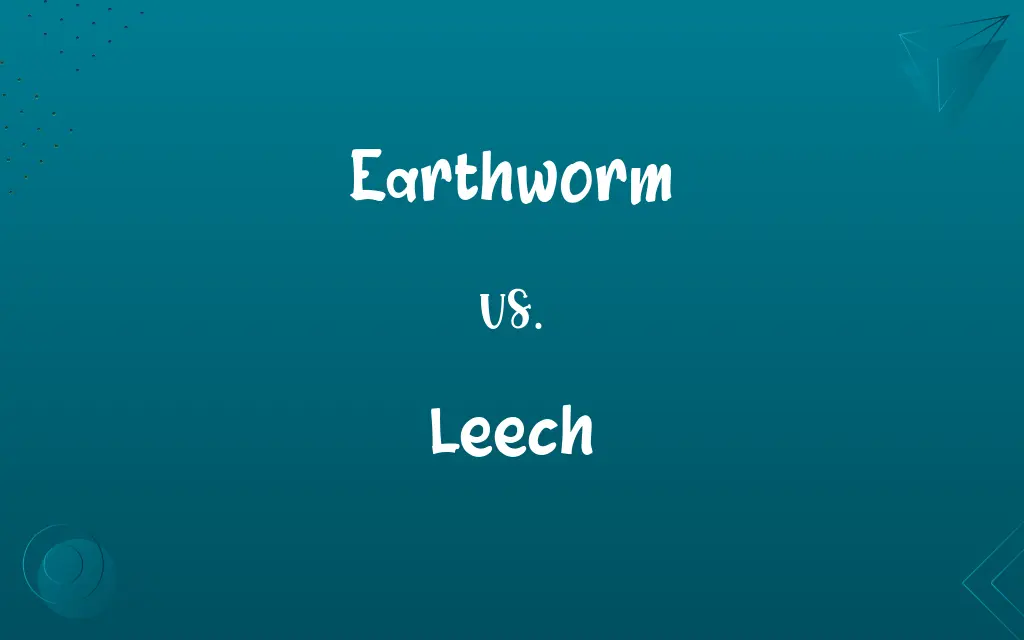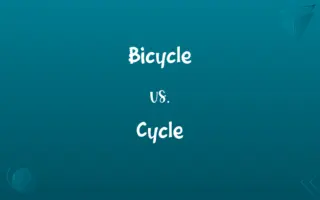Earthworm vs. Leech: Know the Difference

By Shumaila Saeed || Updated on December 25, 2023
Earthworms are beneficial soil-dwelling decomposers; leeches are aquatic or terrestrial bloodsuckers or scavengers.

Key Differences
Earthworms predominantly inhabit moist soil, playing a crucial role in soil health and aeration. Leeches, on the other hand, are mostly found in freshwater environments, where they either feed on blood from various animals or act as scavengers.
Shumaila Saeed
Nov 29, 2023
Earthworms have a long, cylindrical, segmented body, adapted for burrowing through soil. Leeches have a flatter, segmented body with suckers at both ends, suited for attaching to hosts or surfaces in aquatic environments.
Shumaila Saeed
Nov 29, 2023
The diet of an earthworm consists mainly of organic matter in the soil, contributing to nutrient cycling. Leeches, depending on the species, can be predators, bloodsuckers, or scavengers, feeding on blood or small invertebrates.
Shumaila Saeed
Nov 29, 2023
Earthworms reproduce through a process known as hermaphroditism, where each individual possesses both male and female reproductive organs. Leeches also exhibit hermaphroditism but often have more complex mating behaviors, involving mutual exchange of sperm.
Shumaila Saeed
Nov 29, 2023
Earthworms are key in enhancing soil fertility and structure, making them vital for ecosystems. Leeches, particularly those that are blood-feeding, have a unique role in ecosystems, sometimes even used medically for bloodletting and other therapeutic purposes.
Shumaila Saeed
Nov 29, 2023
ADVERTISEMENT
Comparison Chart
ADVERTISEMENT
Earthworm and Leech Definitions
Earthworm
A segmented, terrestrial invertebrate in the class Oligochaeta.
The earthworm wriggled across the damp soil after the rain.
Shumaila Saeed
Nov 24, 2023
Leech
A bloodsucking or predatory freshwater annelid.
The leech attached itself to the skin of the swimmer.
Shumaila Saeed
Nov 24, 2023
Earthworm
A soil-dwelling worm that aids in decomposition and soil fertility.
Gardeners appreciate earthworms for their role in enriching soil.
Shumaila Saeed
Nov 24, 2023
Leech
Any parasitic or predatory invertebrate resembling a leech.
The metaphorical leech drained his resources with its constant demands.
Shumaila Saeed
Nov 24, 2023
Earthworm
An organism used in vermiculture and vermicomposting.
We added earthworms to our compost bin to speed up the composting process.
Shumaila Saeed
Nov 24, 2023
ADVERTISEMENT
Leech
An aquatic or terrestrial worm with suckers at both ends.
The leech moved slowly across the wet leaf, searching for a host.
Shumaila Saeed
Nov 24, 2023
Earthworm
A type of worm often used in scientific studies and education.
In biology class, we studied the anatomy of an earthworm.
Shumaila Saeed
Nov 24, 2023
Leech
Any of various chiefly aquatic carnivorous or bloodsucking annelid worms of the class (or subclass) Hirudinea, of which one species (Hirudo medicinalis) was formerly widely used by physicians for therapeutic bloodletting.
Shumaila Saeed
Oct 19, 2023
Earthworm
A burrowing annelid worm known for aerating soil.
Earthworms create tunnels that help to aerate and structure the soil.
Shumaila Saeed
Nov 24, 2023
Earthworm
Any of various terrestrial annelid worms of the class Oligochaeta, especially those of the family Lumbricidae, that burrow into and help aerate and enrich soil.
Shumaila Saeed
Oct 19, 2023
Earthworm
A worm of the family Lumbricidae, or, more generally, of the suborder Lumbricina.
Shumaila Saeed
Oct 19, 2023
Earthworm
Any worm of the genus Lumbricus and allied genera, found in damp soil. One of the largest and most abundant species in Europe and America is L. terrestris; many others are known; - called also angleworm and dewworm.
Shumaila Saeed
Oct 19, 2023
Earthworm
Terrestrial worm that burrows into and helps aerate soil; often surfaces when the ground is cool or wet; used as bait by anglers
Shumaila Saeed
Oct 19, 2023
Leech
An aquatic blood-sucking annelid of class Hirudinea, especially Hirudo medicinalis.
Shumaila Saeed
Oct 19, 2023
Leech
(figuratively) A person who derives profit from others in a parasitic fashion.
Shumaila Saeed
Oct 19, 2023
Leech
A glass tube designed for drawing blood from damaged tissue by means of a vacuum.
Shumaila Saeed
Oct 19, 2023
Leech
To apply a leech medicinally, so that it sucks blood from the patient.
Shumaila Saeed
Oct 19, 2023
Leech
To drain (resources) without giving back.
Bert leeched hundreds of files from the BBS, but never uploaded anything in return.
Shumaila Saeed
Oct 19, 2023
Leech
A physician or surgeon; a professor of the art of healing.
Leech, heal thyself.
Shumaila Saeed
Oct 19, 2023
Leech
Any one of numerous genera and species of annulose worms, belonging to the order Hirudinea, or Bdelloidea, esp. those species used in medicine, as Hirudo medicinalis of Europe, and allied species.
Shumaila Saeed
Oct 19, 2023
Leech
A glass tube of peculiar construction, adapted for drawing blood from a scarified part by means of a vacuum.
Shumaila Saeed
Oct 19, 2023
Leech
Carnivorous or bloodsucking aquatic or terrestrial worms typically having a sucker at each end
Shumaila Saeed
Oct 19, 2023
Leech
A follower who hangs around a host (without benefit to the host) in hope of gain or advantage
Shumaila Saeed
Oct 19, 2023
Leech
Draw blood;
In the old days, doctors routinely bled patients as part of the treatment
Shumaila Saeed
Oct 19, 2023
Leech
A creature used historically in medicine for bloodletting.
Medieval doctors often used leeches for therapeutic bloodletting.
Shumaila Saeed
Nov 24, 2023
Leech
A term used figuratively to describe a person who exploits others.
He was regarded as a leech, always taking from others without giving back.
Shumaila Saeed
Nov 24, 2023
Repeatedly Asked Queries
How do earthworms help the soil?
They aerate the soil and help decompose organic material.
Shumaila Saeed
Nov 29, 2023
Do all leeches suck blood?
No, some are predators or scavengers, not bloodsuckers.
Shumaila Saeed
Nov 29, 2023
What is an earthworm?
A segmented invertebrate that lives in soil and aids in decomposition.
Shumaila Saeed
Nov 29, 2023
Do earthworms have a brain?
Yes, a simple one located in the front segment.
Shumaila Saeed
Nov 29, 2023
What is a leech?
A bloodsucking or predatory worm, often found in freshwater.
Shumaila Saeed
Nov 29, 2023
Are leeches dangerous to humans?
Most are not, but some can transmit diseases.
Shumaila Saeed
Nov 29, 2023
Can earthworms be harmful?
Generally, no. They are beneficial for soil health.
Shumaila Saeed
Nov 29, 2023
Are earthworms good for gardens?
Yes, they improve soil structure and fertility.
Shumaila Saeed
Nov 29, 2023
Can leeches survive out of water?
Some terrestrial species can, but most prefer aquatic environments.
Shumaila Saeed
Nov 29, 2023
Do earthworms have eyes?
No, they sense light and vibrations through their skin.
Shumaila Saeed
Nov 29, 2023
How do leeches feed?
Bloodsucking species use their suckers to attach to hosts and extract blood.
Shumaila Saeed
Nov 29, 2023
How long can leeches live?
It varies, but some species live for several months to years.
Shumaila Saeed
Nov 29, 2023
Are leeches used in medicine?
Yes, for treatments like bloodletting and microsurgery.
Shumaila Saeed
Nov 29, 2023
What is the lifespan of an earthworm?
Typically 1-2 years, but can vary with species and conditions.
Shumaila Saeed
Nov 29, 2023
Can leeches feel pain?
It's unclear, as their nervous system is less complex than mammals.
Shumaila Saeed
Nov 29, 2023
Do leeches have a role in the ecosystem?
Yes, they help in nutrient cycling and as food for other animals.
Shumaila Saeed
Nov 29, 2023
How do leeches reproduce?
They are hermaphrodites and exchange sperm during mating.
Shumaila Saeed
Nov 29, 2023
Can earthworms regenerate lost segments?
To some extent, but not as effectively as some other invertebrates.
Shumaila Saeed
Nov 29, 2023
Share this page
Link for your blog / website
HTML
Link to share via messenger
About Author
Written by
Shumaila SaeedShumaila Saeed, an expert content creator with 6 years of experience, specializes in distilling complex topics into easily digestible comparisons, shining a light on the nuances that both inform and educate readers with clarity and accuracy.









































































